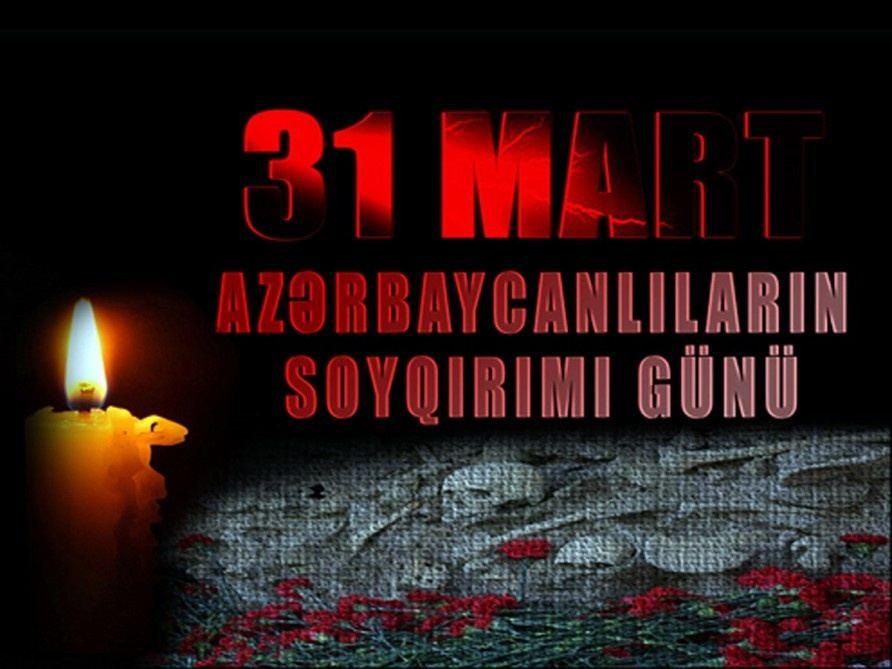Baku urges fair int'l assessment of Armenia's genocide against Azerbaijanis

By Sabina Mammadli
Human Rights Commissioner Sabina Aliyeva has urged the international community and international organizations to conduct the necessary fair and transparent political and legal assessments of the genocide against Azerbaijanis in order to protect human rights and prevent future occurrences.
She made the remarks in a statement issued ahead of the March 31 commemoration of the Day of the Genocide of Azerbaijanis.
"I... revere the memory of the victims of the genocide against Azerbaijanis and call on the international community and international organizations to give a necessary political and legal assessment of this act of genocide to protect human rights and prevent the recurrence of such cases in the future," Aliyeva said.
Ethnic cleansing
She emphasized that "throughout history, Armenian nationalists with the dream of establishing a 'Greater Armenia' state have purposefully pursued a policy of genocide, ethnic cleansing, and deportation of the Azerbaijani people. The most heinous manifestation of this policy is the genocide committed beginning in March 1918".
Tens of thousands of civilians were killed as a result of this genocide in Baku, other cities and provinces of the Baku Governorate, Shamakhi, Guba provinces, Karabakh, Zangazur, Nakhchivan, Lankaran, and other regions of Azerbaijan due to their ethnic and religious background, the commissioner stressed in her statement.
"Furthermore, settlements, cultural monuments, mosques and other places of worship, and cemeteries were destroyed. Some 110 Shamakhi villages, 167 Guba villages, more than 150 Karabakh villages, 115 Zangazur villages, and 98 Kars villages were destroyed, burned, and their inhabitants were killed," the statement added.
Over 50,000 Azerbaijanis, including women, children, and the elderly, were killed between March and July 1918 as a result of bloody crimes committed by Armenian armed groups in Baku, Shamakhi, Guba, Mughan, Lankaran, and Goychay cities and districts.
“Furthermore, 199 villages were destroyed in and around the historical territory of Azerbaijan - Iravan city, as a result of which 132,000 Azerbaijanis were killed,” the statement said.
The rights commissioner added that despite the fact that more than a century has passed since this genocide, those bloody events have not been forgotten and have left indelible marks on the nation's blood memory.
"As a result of the investigation, the facts of Armenian mass exterminations committed during the events of 1918, as well as countless human bones and other material evidence, were revealed," the statement continued.
Political assessment
Aliyeva described as an important step a relevant decree issued by late national leader Heydar Aliyev in 1998 in the political assessment of the genocide.
"The presidential decree 'On the Genocide of Azerbaijanis', signed on March 26, 1998, by national leader Heydar Aliyev, was an important step in revealing the historical truth. As a result, these heinous events were given a political assessment, and March 31 was declared the Day of the Genocide of Azerbaijanis," the statement noted.
Aliyeva added that the Genocide Memorial Complex was established in Guba city under President Ilham Aliyev's appropriate order to convey these truths to the world community and to memorize the genocide victims.
She stressed that every year, thousands of people visit the venue to commemorate the murdered compatriots.
Lacking appropriate int'l response
Aliyeva emphasized that according to international law, genocide is considered the most serious crime against peace and humanity.
"Unfortunately, despite the fact that there is enough evidence and proof of Armenia's genocide against Azerbaijanis, there has been no adequate response to these crimes against humanity, and double standards have been demonstrated in respect of Azerbaijan. In this regard, the European Parliament's resolution of 10 March 2022 on the alleged destruction of Armenian cultural heritage in Karabakh once again demonstrated double standards and biased policy against our country," Aliyeva stressed.
She underlined that Armenia, which has committed numerous crimes against Azerbaijani civilians over the past 30 years of occupation, has purposefully and systematically destroyed all Azerbaijani historical, cultural, religious monuments, archeological sites, libraries, museums, artifacts, rare manuscripts, and cemeteries.
“Despite the Azerbaijani side’s repeated calls during these years, no fact-finding mission has been established by relevant international organizations to investigate these issues on the spot,” the statement said.
Aliyeva added that "the failure to respond to ethnic cleansing and genocide committed by Armenia against the Azerbaijani people for many years, along with acts of vandalism against our cultural heritage, is a clear example of discrimination and indifference to states and contradicts the principles of international humanitarian law”.
Azerbaijan expects fair approach to Armenian crimes
The statement emphasized that, unlike mono-ethnic Armenia, Azerbaijan, as a state adhering to the principles of tolerance and multiculturalism, is taking all necessary steps to ensure peace, stability, and security in the South Caucasus, as well as to restore the peaceful coexistence of nations.
“I believe that international organizations and the international community must demonstrate a fair and transparent approach with regard to the investigation into crimes against civilians, and the facts and evidence-based cases of destruction of cultural heritage belonging to Azerbaijanis. I once again remember the victims of the genocide against Azerbaijanis with deep sorrow,” the statement said.
This statement was addressed to the UN Secretary-General, UN Security Council, Office of UN High Commissioner for Human Rights, Office of UN High Commissioner for Refugees, UN Human Rights Council, the United Nations Children’s Fund, the United Nations Educational, Scientific and Cultural Organization, the European Union, the Council of Europe, Organization for Security and Co-operation in Europe, International and European Ombudsman Institutions, Asian Ombudsman Association, Organization of Islamic Cooperation and the Ombudsman Association of its member states, etc.
---
Here we are to serve you with news right now. It does not cost much, but worth your attention.
Choose to support open, independent, quality journalism and subscribe on a monthly basis.
By subscribing to our online newspaper, you can have full digital access to all news, analysis, and much more.
You can also follow AzerNEWS on Twitter @AzerNewsAz or Facebook @AzerNewsNewspaper
Thank you!
